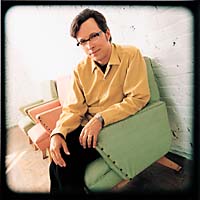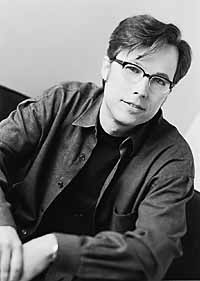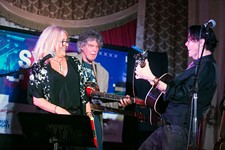See What You Want to See
By Jim Caligiuri, Fri., May 28, 1999
 "I got to the point where mainstream Nashville took a big right turn on a musical and production level in the past five years and I took a big left turn," says Radney Foster. He's sitting on the bed of his modest hotel room in Austin, dressed casually in shorts and white T-shirt, sunglasses shading his bleary eyes after a night of too little sleep. It's only the second day of a tour to promote his decidedly different new album, See What You Want to See, and he's adjusting to the grind of riding in a van throughout the South. "No, we can't afford a bus just yet," he explains with a sigh.
"I got to the point where mainstream Nashville took a big right turn on a musical and production level in the past five years and I took a big left turn," says Radney Foster. He's sitting on the bed of his modest hotel room in Austin, dressed casually in shorts and white T-shirt, sunglasses shading his bleary eyes after a night of too little sleep. It's only the second day of a tour to promote his decidedly different new album, See What You Want to See, and he's adjusting to the grind of riding in a van throughout the South. "No, we can't afford a bus just yet," he explains with a sigh.
Foster has undergone quite a few changes since his last release, one of them being a lower-profile label -- Arista Austin -- which translates into smaller budgets for things like touring. The upside is he gets to make the music he wants to make. Most significantly, he's still hungry, belying a remarkably assured attitude strengthened by the trials and tribulations he's been through in the past four years. Between 1994's Labor of Love and his new release, Foster has gone through a series of life-changing highs and lows: the struggle of divorce, new love and remarriage, and the pain of having his young son moved to Europe. See What You Want to See was born of these joys and sorrows.
"I was writing songs from such a personal place that they dictated a different approach," explains Foster. "I had to let go, and do something from my heart."
The results are a far cry from the country twang and roots rock Foster has been known for since his days as one half of popular Nashville duo Foster & Lloyd or as a successful Top Ten country solo artist penning his own singles ("Just Call Me Lonesome," "Nobody Wins"). See What You Want to See is an adult pop album, full of atmospheric guitars, funky grooves, and look-you-straight-in-the-eye lyrics about love and betrayal.
"I've quit writing songs just for the sake of structure or rhyme," says the 39-year-old songwriter. "I'm gonna say what my soul needs to say, because I think that kind of honesty leads to better songs. It's more important to communicate what's in my heart and soul about love, fear, rejection, and hope. That's what this album is about."
When the subject of his recent past comes up he exclaims, "I don't think you can deal with the new record without dealing with the history of what I've been through."
Foster's history begins with his being born in the border town of Del Rio, Texas, the son of a lawyer and a schoolteacher.
"Del Rio in the Sixties seemed kind of normal to me," he explains, "but it was really kind of wild in a lot of ways. You had XERF blasting away over the airways from across the river in Ciudad Acuna, Mexico. I was one of those kids with a transistor radio and earphone hiding under the covers at 8 or 9 years of age."
Foster remembers tuning in stations like WBAP out of Dallas and San Antonio's WOAI, but mostly it was XERF from across the river.
"It was so weird because at that time, which was the late Sixties, early Seventies, I think it was Paul Kalinger who was spinning trucker records really heavily. He didn't seem to care about the Nashville versus hippie-kid country thing, so it was the first place I heard people like Waylon Jennings, Asleep at the Wheel, and Willie Nelson -- things that were really rockin' and cool."
Another element adding to the confluence of "weirdness" in Del Rio was the Air Force base, which in the late Sixties/early Seventies was used as a base for U2 spy planes. Foster recalls friends of his parents, Air Force pilots, inviting the Fosters over for Alaskan king crab or blue point oysters from Maine. As it turns out, the neighbors were spying on Russia and picking up their exotic eats at one of their refueling stops. Their parties were always notable.
"At these parties, they'd pass a guitar around and play whatever had three chords and they felt was cool," recalls Foster. "It could be anything from Fats Waller to Jimmie Rodgers to Hank Williams to Merle Haggard to Elvis. I have very vivid memories of falling asleep in my parents' lap listening to all this music.
"By the time I was 10-11 years old, it was pretty easy to pick up the guitar. My older sister sang -- sang really well. I remember the first time I ever played the guitar in public was in church backing up my sister, but they wouldn't let me sing because my voice was changing."
 Foster's musical career began in earnest when he attended the University of the South in Swannee, Tennessee. There he played in a number of bluegrass, rock, and country bands, and started writing songs. In 1979, while performing in a duo at college, he was approached by a Nashville-based producer named Brown Bannister, who was impressed enough with Foster's songwriting talent to encourage the young musician to go to Nashville and try his luck. Initially he resisted.
Foster's musical career began in earnest when he attended the University of the South in Swannee, Tennessee. There he played in a number of bluegrass, rock, and country bands, and started writing songs. In 1979, while performing in a duo at college, he was approached by a Nashville-based producer named Brown Bannister, who was impressed enough with Foster's songwriting talent to encourage the young musician to go to Nashville and try his luck. Initially he resisted.
"In the summer of 1980, me and my buddy went to Europe and we'd play in the streets and were making money. I was supposed to get back to the States in time for school to start, but we thought we could stay there forever. Eventually reality set in and when I got back home, I told my parents I really wanted to go to Nashville for a year and try it out. They reluctantly agreed and I went through a year of knocking on doors and soul searching, ending up back at school the next year like a whipped puppy with my tail between my legs. But I knew that was what I wanted to do."
Even though the music industry in Nashville was much smaller in the early Eighties, Foster had doubts about becoming a country artist, knowing the odds long and his shot slim. In 1985, he signed with music publishers MTM. Owned and operated by Meredith Stewart and Tommy West, who had made his name producing Jim Croce albums, MTM boasted a couple of Nashville rock bands, and Bill Lloyd.
"That's where I met Bill for the first time," says Foster. "It really was a factory, though. They'd hear that Dolly Parton was looking for a song and in a day or so they'd have something down on a demo that sounded like it was meant for Dolly Parton. That's remarkable to me even though some people belittle it. Holland, Dozier, Holland -- Lieber and Stoller -- those guys came up with a hook and produced and sold it. How can you belittle it?"
By comparison, Foster writes mostly by himself these days, acknowledging that he still takes on projects for which there are no guarentees that the two principals involved won't sit there staring at each other for a couple of hours.
"To me, songwriting is about the mining of your soul. When I collaborate with someone, I need to know what their life is like and how I relate to that."
Bill Lloyd was obviously a kindred spirit.
"We were sort of the new young turks with some street sense that started hanging out together. We sort of used each other. I thought he was more of a rock guy and maybe someone would pay attention to my rock stuff if I hung out with him and he felt the same about me and his country side.
"We built up a friendship and started to develop a following and it was really fun. We would go and do nights at the Bluebird Cafe where I'd play a set, he'd play a set, and then we'd play a set together. Of course, this was back when the Bluebird was just a beer joint and not a famous club."
It was around this time that RCA Records came into the picture. Foster & Lloyd had just gotten their initial break, having Sweethearts of the Rodeo record the duo's "Since I Found You," which became a Top Ten country hit. This, of course, created a buzz about Radney & Bill. At the time, there was also something different going on in Nashville. Rodney Crowell had had some hits, Dwight Yoakam had just arrived on the scene, and Steve Earle had been signed to MCA. Lloyd was in a band with a guy who was working in RCA's marketing department named Randy Goodman.
"Bill was scheduled to release an album called Feeling the Elephant on Throbbing Lobster Records," remembers Foster, "and he gave a tape of it to Goodman. It had the album on one side and on the other side he put some of the stuff we'd been working on together as a duo. We thought maybe we'd get some songs cut. But he fell in love with our stuff and told us he thought we were an act. RCA said they wanted to see us play live, so we rented a studio, and got some guys from Bill's rock band together.
"Bruce Bouton, who was Ricky Skaggs' steel player, helped us out, as did Mike McAdam, who was Steve Earle's guitar player. We rehearsed for three days and then RCA label head Joe Galante came and saw us and it was lawyers, guns, and money from there. That's exactly what they said after we played: 'Boys, it's lawyers, guns, and money from here on out.'"
Foster & Lloyd's self-titled debut was a big, and for the time, rather unique success. A mix of Everly Brothers harmonies, midtempo rockabilly, and Byrds-y jangle with lean arrangements and engaging lyrics, it caught many by surprise.
"They let us produce it ourselves, since we had done a good job on the demo and they liked that," explains Foster. "We were pretty much left to our own devices. The weird thing was that it was successful at country radio and also at college radio, which they didn't even try to work. That just happened. We asked them to ship it to college radio and they were surprised that the college radio department was getting such a great response."
The duo continued with decreasing amounts of success and increasing record company intervention; only hardcore fans know there are two different versions of their last album, 1989's Version of the Truth, which was remixed and had some shuffling of tracks after its initial release. In 1990, after four years and three albums together, Foster & Lloyd parted ways amicably. The two still perform together on rare occasions in an acoustic setting, just like the old days.
Foster went on to moderate success as a solo country artist, releasing two acclaimed albums, '92's Del Rio, Texas 1959 and Labor of Love, two years later. That same year, 1994, while doing preliminary work on what was to be a third solo disc, Foster's personal life fell apart. Beginning with an emotionally draining divorce, the next four years were to be a nonstop roller coaster ride of the soul. Foster remarried in '96, but then was plunged into a brutal (and ultimately unsuccessful) lawsuit to prevent his ex-wife from moving their young son to France. Things eventually ground to a halt.
"The record I had been working on in '94 was being produced by Mac McAnally and the label felt it wasn't complete," says Foster. "It was intended to be a country record on Arista Nashville. Two years later, I was a different guy and I went and recorded some more and when I brought that to the label they said, 'This isn't country,' and I said, 'No, it's not, but if you want to be a part of it, this is what I'm doing.' I thought they were going to let me go."
Tim Dubois, president of Arista Nashville, had other ideas.
"I can't speak highly enough of Tim Dubois," Foster says appreciatively. "He suggested that I take it to the Arista Austin guys [see sidebar], which I did. They fell in love with it. We used 'The Kiss' from the other recording sessions and 'God Knows When' was also on the other record, but we recut it, because we felt it was important."
Originally set to be out in the fall of 1998, See What You Want to See was held on the eve of its release to allow for Arista Austin's corporate restructuring. Foster couldn't tell if he was bulletproof or just plain numb.
"I think there's something really important in making records that comes out of you when your 'give-a-shit' meter goes to nothing," asserts Foster.
Thankfully, however, 1998 eventually yielded forward progress. Foster's happily remarried, and the couple is expecting their first child in July. The expectant father has also managed to maintain a good relationship with his son in France, despite the distance. Musically, he's distanced himself somewhat from his past, expanding his musical palette far beyond the constraints of country music, what with Abra Moore, Sister 7's Patrice Pike, and Darius "Hootie" Rucker adding their vocals to See What You Want to See. Yet he's done it all on his own terms and maintains an exceptionally serene attitude about all he's been through.
"I can only control what I do," he proclaims. "I hope everyone else does their part, but I can't worry about them. At the end of the day, I just have to be satisfied with myself."
Radney Foster plays the Continental Club Friday, May 28, 10pm.








